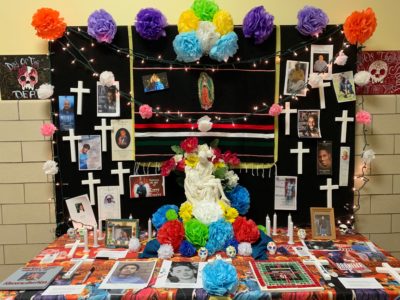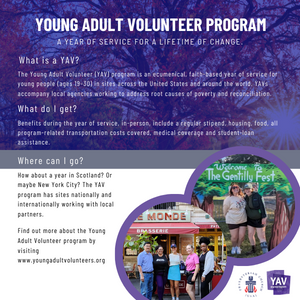By Lina Guerrero, Precious Blood Volunteers
It was around 7 o’clock in the morning on October 10th, 2011 in Austin, Texas. I was seventeen years old and sitting outside on the porch of my house with our pastor Fr. Bill Wack, C.S.C. (now known as Bishop Bill, but I still can’t help but call him Fr. Bill). It was a Monday morning, the usual day when the trash collectors come. I remember sitting there in silence with Fr. Bill watching the world go by and workers going about their day trying to make their living. The collectors reach my house and just passed by, because we hadn’t put the trash bins out. They go along, but we stayed there, sitting still. I turn to Fr. Bill and say to him, “It’s weird how they just go about their day, and they have no idea what’s going on in this house or why our trash bins aren’t on the curb.” He just looks up, smiles, and says to me, “Yeah, it’s almost like an ignorant bliss.”
About an hour before this scene my aunt—affectionately known as Tia Mari—had died after a long five-month stint in hospice care in my home. She had been battling breast cancer for a long time, and that moment on the porch after her painfully long death was filled with a crippling sense of anger, sadness, relief, and confusion. How can people like those trash collectors go about their day when we’re sitting here with our world rocked by the death of our loved one? How can the world go on when we’re sitting here still, feeling like we can’t move, or even breathe? I remember feeling angry about this realization, specifically because the world and the people in it move everyday in the “ignorant bliss” of so much death and suffering.
Fast forward to December 5th, 2018. I’m sitting in the large gathering room at Precious Blood Ministry of Reconciliation (PBMR) in Chicago, Illinois. There is a heaviness and stillness in the place, much like that morning on the porch, and I’m feeling that same sense of anger all over again except this time it is for a very different reason. That morning we woke up to the news that one of our young men in our programs was killed during the night. He was 21 years old, and appeared rather frequently at the center. I interacted with him occasionally, but not enough to know him on a personal level. However, many people at the center knew him very well for many years. This young man is the latest PBMR family member to die, and unfortunately death is known very well here. The reality of death is with us everyday, almost as if we are constantly waiting for it to happen, but hoping and praying that it doesn’t.

2018 Day of the Dead altar at PBMR
For as long as I can remember, I have always had a weird relationship with death. During my year as a Jesuit Volunteer in Kansas City, I remember crying in the middle of a bar with my spiritual director while talking about the spirituality of death. Everytime I hear that someone has died, I sort of get a sense of numbness. And if I’m being honest, I don’t know if this numbness comes from me having multiple experiences of people close to me dying, or if the concept of death just scares the hell out of me.
So why do I currently volunteer/work at a place where death is a common occurrence? Hell, I ask myself that question everyday. But if there’s anything I can say, I think it comes from the fact that it’s one thing to die from an illness, a car accident, or natural causes- things that we have no control over-but a completely different thing for someone to die from violence, a cause that can, should, and could have been prevented by various measures. The deaths we encounter most at PBMR are deaths of the latter kind – deaths that, because our society is structured and conditioned to value some lives more than others, rock communities and individuals to their very core.
But like that morning on the porch and that morning at the Center, the anger at the ignorance of death–whether it is intentional or not–makes me feel some kind of way. I think of the way people are killed in the streets everyday, and people go about their lives as if it doesn’t matter. Jesuit Father Greg Boyle of Homeboy Industries has said that, “The wrong idea has taken root in the world. And the idea is this: there just might be lives out there that matter less than other lives.” How many people in our society would ask whether the young man who died was a gang member? A Black man? Someone who lived on the south side of Chicago? Why was he walking late at night? Did he deserve to die even if all of those things were true? These are the questions that I’ve been asking myself since that morning. And I can definitely tell you that according to the many people who knew this young man here at PBMR, he didn’t deserve to die. His life mattered, even if the ignorance of others says otherwise.
I’m going to be straight up and say that I don’t have any answers to what I speak of here. But what I do know is that I’m tired of living in a world where we have to convince people to care about others, to pay attention to their own privilege, to not be in their own “ignorant bliss” about the lives of others due to the perception that some lives matter more than others. I get angry a lot about these things now-a-days, and I think that’s okay. Jesus got angry and flipped tables too. But also like Jesus with Lazarus, He made space to honor the anger of Martha, to weep and mourn the death of His friend. And even though we know that death doesn’t have the final word, the anger, the weeping, and lamentation are holy too. And that’s where I want to be.

PBV Lina Guerrero
Lina is a current Precious Blood Volunteer serving at Precious Blood Ministry of Reconciliation in Chicago. To learn more about becoming a Precious Blood Volunteer, click here.
This article originally appeared in the January 2019 edition of the New Wine Press.



 Thousands of faith-based service opportunities can be at your fingertips with the RESPONSE. Download the latest edition today!
Thousands of faith-based service opportunities can be at your fingertips with the RESPONSE. Download the latest edition today!
